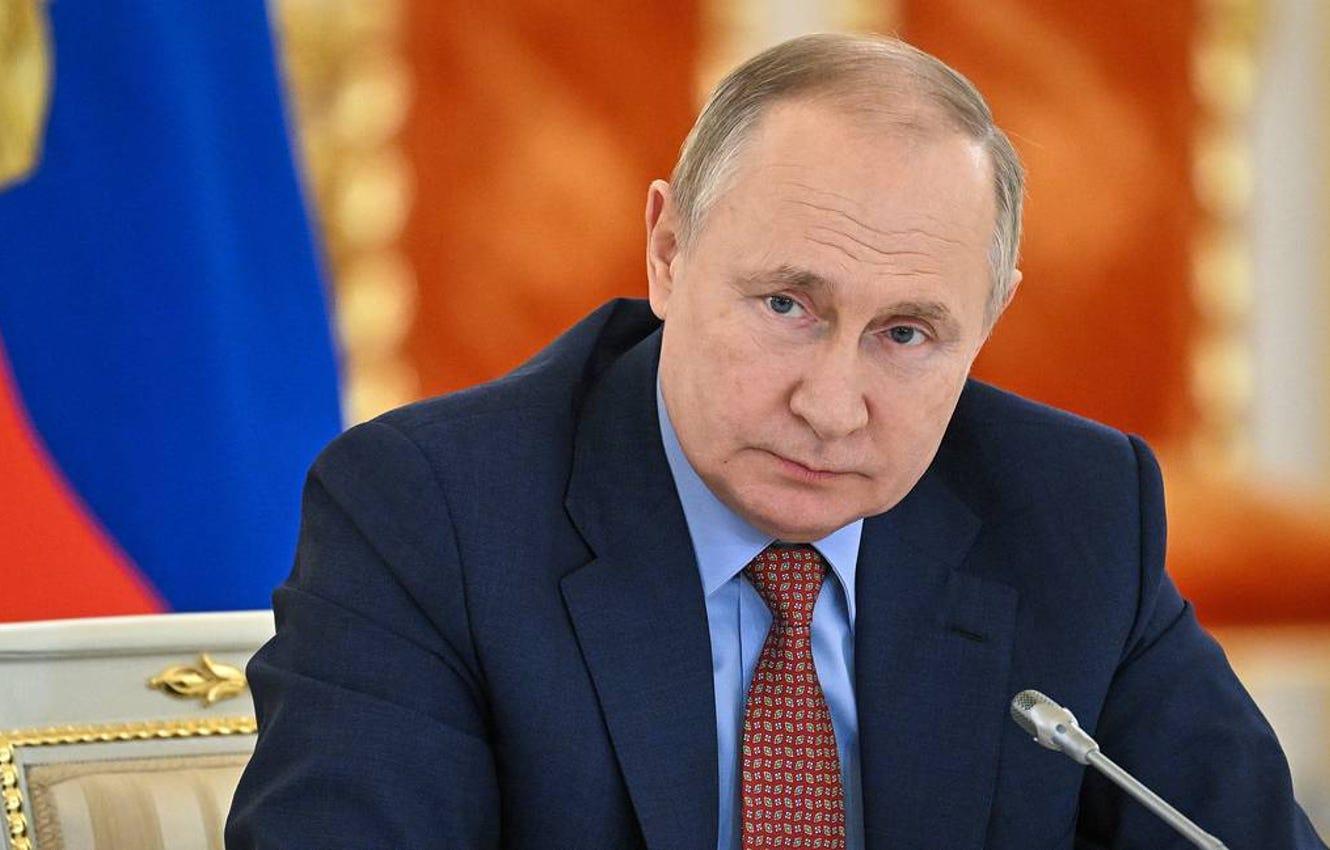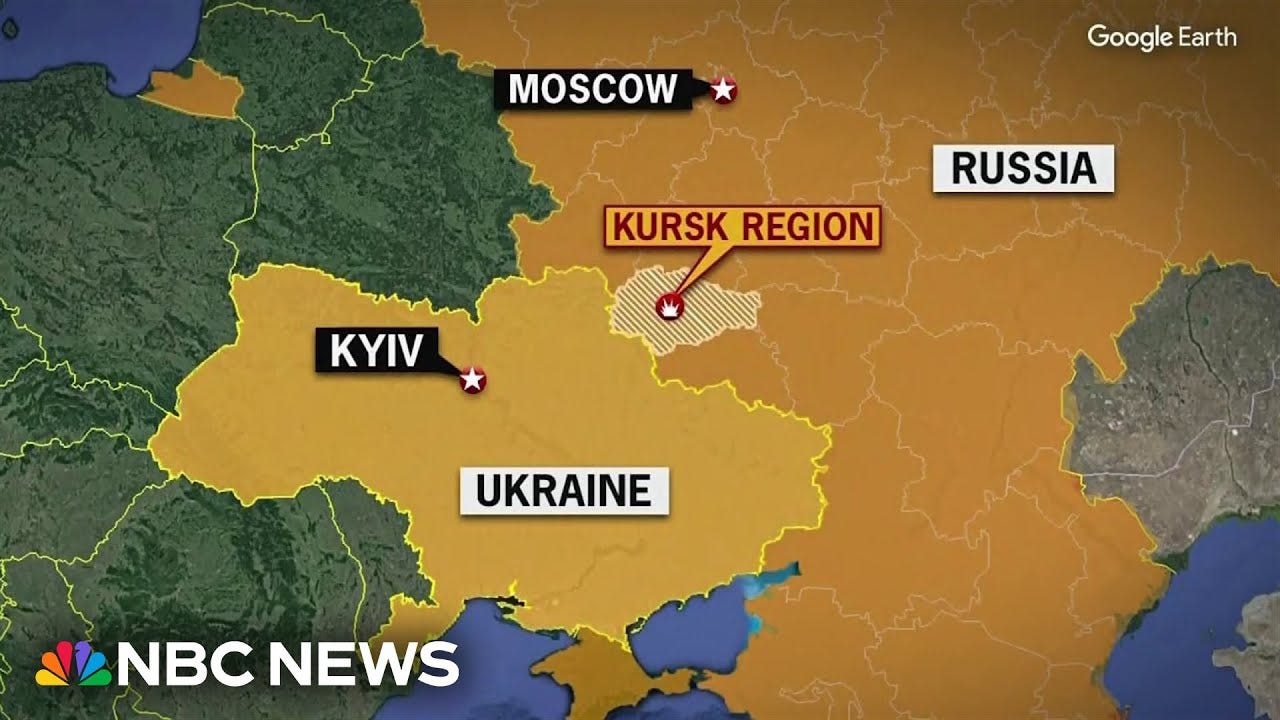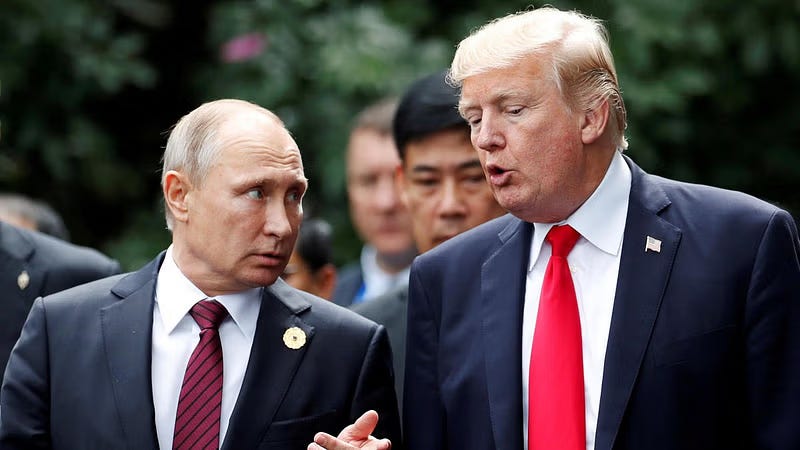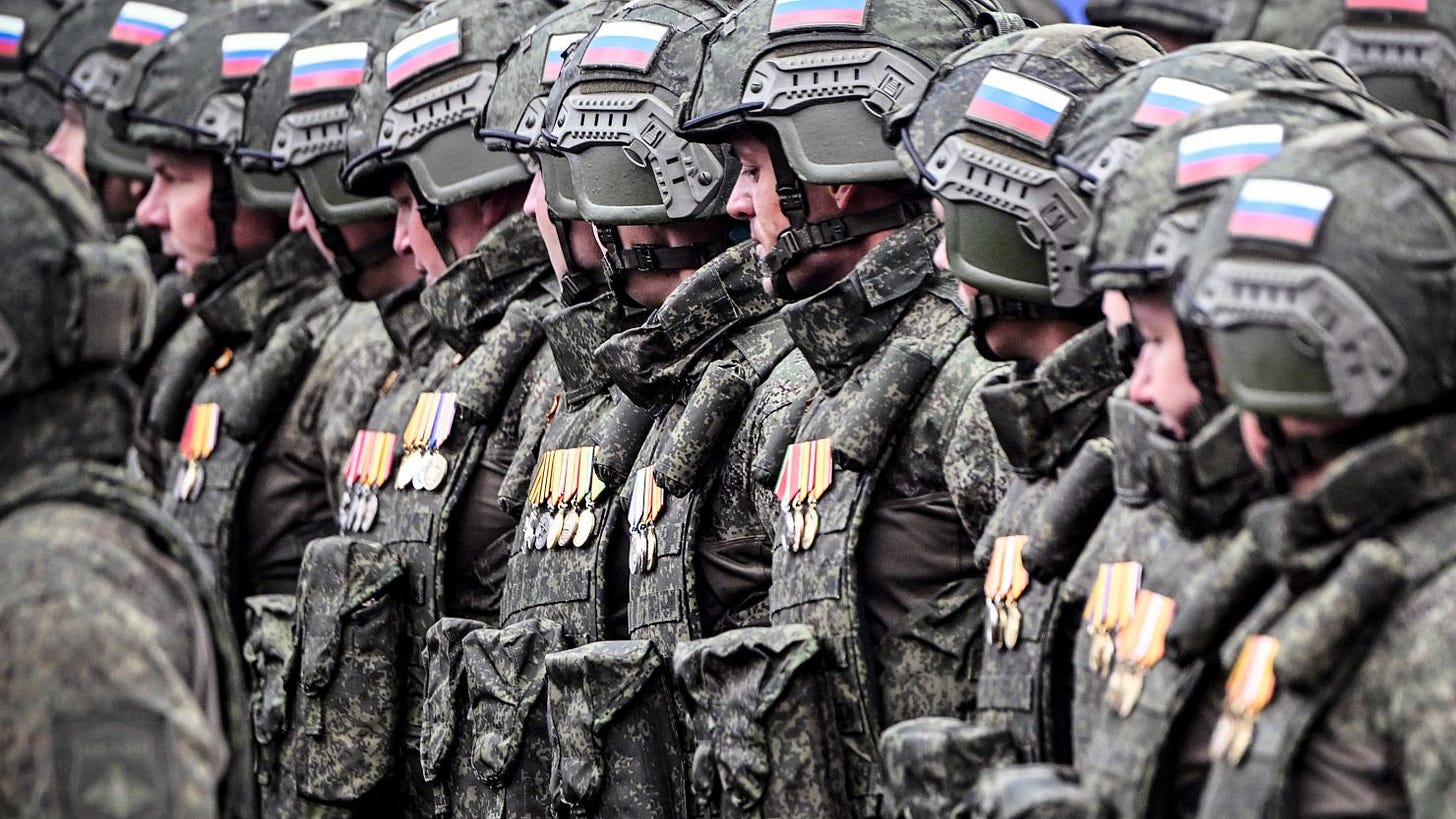Russia’s Endgame
Putin wants total control of Ukraine. His recent diplomatic moves show it.
Sponsored by
Vladimir Putin's real goal has never changed: to keep Ukraine firmly within Russia's sphere of influence, either by controlling its territory directly or by ensuring that it remains weak and unable to defend itself. His recent response to peace overtures highlights the strategy he has used repeatedly over the years.
Last week, the United States and Ukraine proposed a 30-day ceasefire aimed at pausing the fighting and creating space for broader peace negotiations. The proposal came as Ukrainian forces have been struggling on multiple fronts while facing dwindling Western military support.
When presented with this offer, Putin delivered what British Prime Minister Keir Starmer aptly called a "Yes, but" response — theoretically supporting the idea while attaching conditions that essentially hollow it out.
Putin’s demands
"The idea itself is the right one, and we definitely support it," Putin said of the ceasefire proposal, before immediately adding, "But there are questions that we need to discuss."
Putin’s conditions reveal his true intentions:
Ukraine must stop mobilizing and training troops during the 30-day pause
Western countries must halt weapons deliveries
The ceasefire "must lead to long-term peace and address the root causes of the crisis"
That seemingly innocuous phrase — "root causes" — is doing the heavy lifting. In Putin's view, the root causes of the conflict include Ukraine's very right to exist as a sovereign nation with its own foreign policy and military. His list of demands reportedly includes international recognition that Ukrainian territory seized by Russia no longer belongs to Ukraine, a ban on foreign peacekeepers, and a guarantee that Ukraine will never join NATO.
The timing of Russia's conditional “acceptance” of the ceasefire terms is significant. It comes as Russian forces are actively advancing on Ukrainian forces in the Kursk region on Russia’s western border.
This area became significant last August when Ukrainian forces launched a surprise cross-border incursion into Russia and seized it — the first time since World War II that foreign troops had occupied Russian territory. The move was strategically designed to divert Russian forces from other battlefronts and damage Russian morale by bringing the war to Russian soil.
Now, Russian forces appear close to reclaiming all of this territory — a symbolic victory Putin can tout during ceasefire talks. By creating a set of circumstances that benefit Russia on the ground while seemingly engaging in peace talks, Putin buys himself a position of maximum leverage.
Conflicting assessments
Trump and Putin are expected to speak today in what would be their second call since January. Trump's team is projecting remarkable optimism. His special envoy Steve Witkoff, who recently met with Putin for several hours in Moscow, told CNN, “The president uses the time frame ‘weeks’ and I don't disagree with him. I am really hopeful that we are going to see some real progress here.”
This rosy assessment contrasts sharply with French President Emmanuel Macron's stark statement that Russia "does not seem to be sincerely seeking peace" and is instead intensifying fighting before negotiating.
To Macron, what we're witnessing isn't a good faith ceasefire negotiation but considerable stall tactics.
Several current and former US officials and Russia experts agree that Putin’s strategy is transparent: stretch out talks long enough to make progress on the battlefield, exhaust Western patience, and force Ukraine into untenable security arrangements that leave it permanently vulnerable.
And it reflects a fundamental question: Is the United States prepared to give Putin what he wants to secure a quick diplomatic win?
Consider the clashing realities: Ukraine seeks guarantees to prevent future Russian aggression. Putin seeks to ensure Ukraine cannot defend itself. These aren't positions that can be bridged with clever diplomatic language.
Trump's team appears to have miscalculated how quickly the process of securing a ceasefire might unfold, despite their public confidence. Secretary of State Marco Rubio outlined a telling two-phase approach in an interview with CBS’s Face the Nation on Sunday: “Plan A is get the shooting to stop so that we can move to plan B, phase two, which is have everybody at a table... to figure out a way to permanently end this war.” He acknowledged that the second part won't be easy, requiring “concessions from both sides.”
And those concessions include Ukraine being forced to cede territory to Russia and to give up its quest to become a member of NATO.
From our sponsor:
The news feels nonstop. Your stress doesn’t have to be. Staying informed is important, but let’s be real—it can be a lot. If the headlines have you feeling anxious, overwhelmed, or just plain exhausted, therapy can help. BetterHelp makes it easy to talk to a licensed therapist from wherever you are, on your schedule. No waiting rooms, no hassle—just support when you need it.
You don’t have to carry it all on your own. Take their assessment and get matched to a therapist in as little as 24 hours.
Sign up here and get 25% off.
Russia has firmly rejected both the idea of Ukraine ever joining NATO and Western peacekeeping troops being deployed to help keep Ukraine secure.
In an interview with the Russian newspaper Izvestia, Deputy Foreign Minister Alexander Grushko called deploying such troops ‘absolutely inappropriate and absurd.’ This comes as reports suggest NATO allies are considering sending more than 10,000 troops to Ukraine as part of a potential ceasefire agreement.
"We will demand that ironclad security guarantees become part of this agreement," Izvestia cited Grushko as saying.
However, Grushko did indicate Russia might accept “the presence of unarmed observers and a civilian mission in Ukraine to monitor the implementation of certain aspects of the agreement.”
This exchange represents Moscow's strongest rejection yet of Western peacekeeping forces, even though such forces are seen by Ukraine's allies as essential to safeguarding European security and deterring future Russian aggression.
National Security Advisor Michael Waltz suggested Sunday morning in an interview with ABC’s This Week that, “This is going to be some type of territory-for-future-security guarantees,” adding that “a permanent pathway into NATO, or permanent membership into NATO for Ukraine, is incredibly unlikely.”
In Washington, a quick agreement on a ceasefire is a political imperative – Trump campaigned on ending the war quickly. In Ukraine, an agreement comes from being left with little choice after Trump suspended critical intelligence sharing and military assistance.
A temporary ceasefire offers Russia multiple advantages: time to replenish troops and equipment (Russia's recruitment and weapons production now outpace Ukraine's), opportunity to push Ukrainian forces out of the Russia Kursk (already happening), and a platform to block future security guarantees for Ukraine by threatening to abandon the ceasefire.
Ukrainian President Volodymyr Zelensky, immediately understanding Putin's tactic, described the Russian leader's response as "very predictable, very manipulative." He highlighted a familiar pattern: "Putin often does this – he does not say 'no' directly, but does so in a way that practically only delays everything and makes normal decisions impossible."
History as warning
Russia has previously used ceasefires as strategic pauses rather than genuine steps toward peace.
In 2014, Russia seized Crimea, a peninsula in southern Ukraine with a Russian naval base and a significant ethnic Russian population. Putin claimed this annexation was necessary to "protect" Russian speakers following Ukraine's pro-Western revolution that year.
After taking Crimea and supporting separatist forces in eastern Ukraine, Russia agreed to the Minsk peace accords in 2014-2015. But these agreements became tools for Moscow to gain time to strengthen its military position, force Ukraine to give special political status to Russian-controlled territories and keep Russian troops in Ukraine despite promises to withdraw.
This history suggests Putin views ceasefires not as paths to genuine peace, but as tactical pauses that allow Russia to consolidate gains and prepare for future aggression when conditions are favorable.
Putin's ultimate goal
What Putin ultimately wants isn't just territory, but control over the entire country — turning Ukraine into a state without true independence. This explains why no territorial concession will ever satisfy Putin permanently; today's settlement merely becomes tomorrow's staging ground for the next advance.
For Ukraine, a peace that leaves it vulnerable to future Russian aggression is no peace at all.
The calculus for Trump is increasingly challenging. Putin may call them “negotiations,” but in reality, his condition for a ceasefire is Ukrainian surrender. This reality doesn't align with Trump's desire for a quick political win and a chance to deepen ties with Putin.
The path forward
Will Trump maintain pressure on Russia or continue seeking Putin's approval at Ukraine's expense? Without significant pressure on Russia, including the threat of renewed Western support for Ukraine, Putin has little incentive to negotiate seriously.
The coming days will reveal whether Washington recognizes Russia’s diplomatic chess game for what it is – and whether it has the skill and patience to outmaneuver Putin, who has always played the long game.











So go back and run this whole article through a “grab for natural resources” lens and the Putin/Trump alliance makes so much more sense. (Ditto Trump’s involvement in Gaza, Canada and Greenland but let’s shelve that for another day 🙄). This is all about dividing up the spoils of war. It’s a real estate grab (the underground version). You know that expression “All politics is local”? Well, I’ve come to see that “All US policy is personal” in Trump’s quest to make himself a much richer man. This is his legacy and our country is the conduit for his enrichment. I almost wish he was a crazy guy with wild ideologies. This is simpler, darker and way more ass-backwards than I ever could have dreamed.
I might have mentioned this comparison in a previous comment, but reading Elise's excellent analysis makes me want to repeat myself—particularly the line "The calculus for Trump is increasingly challenging". I agree it's challenging compared to before Trump’s 2nd inauguration, but it's so much easier than during his first term. This shift isn't because Russia has become more trustworthy, but because the Republican party has transformed into Trump's unquestioning apparatus, abandoning any values that aren't Trump’s own.
Remember Helsinki 2018? Standing beside Putin, Trump took the Russian president's denial of election interference at face value, saying "I don't see any reason why it would be Russia" despite overwhelming evidence and consensus from our intelligence agencies. The backlash from his own party was swift and severe:
Then-Speaker Paul Ryan immediately responded: "There is no question that Russia interfered in our election and continues attempts to undermine democracy... The president must appreciate that Russia is not our ally." Senator John McCain called it "one of the most disgraceful performances by an American president in memory." Senator Bob Corker said Trump "made us look like a pushover." Even Senator Lindsey Graham, now one of Trump's most ardent defenders, tweeted that it was a "missed opportunity... to firmly hold Russia accountable for 2016 meddling." None of these things would be said by a Republican today unless they were announcing their retirement.
Trump's damage control back then was comical—claiming he misspoke and meant to say "wouldn't" instead of "would." If you actually insert that word, his entire statement becomes nonsensical, as he spent the entire press conference defending Putin only to suddenly say he not only thinks Putin did, but that he couldn’t imagine it possible that he didn’t, just in one random disagreeing sentence? It was an embarrassment on top of the previous embarrassment. He was admitting (through a transparent, absurd lie) that he wanted to be seen as strong against Putin but didn’t have the guts to confront him at all.
Fast forward to 2025, and what a difference! We watched as Trump not only embraced Putin's talking points but publicly humiliated President Zelenskyy in the Oval Office for daring to suggest Putin might break a ceasefire agreement. Instead of Republican outrage, we saw:
JD Vance, now vice president, actively joined in the berating of a wartime ally, suggesting that not groveling sufficiently to the president was reason enough to show our ally to the door. A pro-Trump reporter had the audacity to criticize Zelenskyy for not wearing a formal suit during a war. GOP leadership like Speaker Johnson declared that "the days of America being taken advantage of and disrespected are OVER." And most tellingly, Lindsey Graham—the same senator who criticized Trump's Russia stance in 2018—not only suggested Zelenskyy should resign but said he had "never been more proud" of Trump than during this grotesque meeting.
The most telling detail from the meeting: when Zelenskyy reminded Trump that Russia has repeatedly broken agreements, Trump responded not by acknowledging this reality but by telling Zelenskyy "you don't have the cards right now" and accusing him of "gambling with World War Three." It is no longer about truth, but political games, and Republicans are cool with that.
This remarkable shift shows that Trump's calculus isn't more challenging—it's dramatically easier. The Republican party hasn't gained any actual trust for Russia, but they no longer see any incentive for questioning Trump's opinion on anything. The contrast between Graham's proud endorsement of Trump's behavior in 2025 versus his criticism in 2018 perfectly encapsulates this transformation. The party has completely realigned, abandoning its long-held adversarial stance toward Russia in favor of whatever position Trump takes. No more awkward splits, no more measured criticism, no more need for clumsy walk-backs. Russia is effectively now our ally.
The real calculus that's become challenging is for Ukraine—and by extension, for the entire post-WWII international order that has maintained relative peace in Europe for over 75 years.